The Top Channels Consumers Use to Learn About Products [New Data]
Imagine you’re scrolling through Instagram and see an ad for a product you might be interested in.
While your first thought might be that ad targeting is getting too advanced, you still want to find out more about the product and the company that makes it. So where do you look next?
Are you going straight to their Instagram page, visiting their website, searching for online reviews, or watching a YouTube unboxing video?
These are the questions we asked 1,000 consumers in our 2022 State of Consumer Trends Survey to find out how people behave after discovering a product they might want.
Of course, this will vary drastically by generation, so we’ll include some insights split by age group as we go. You can also check out our full report on consumer shopping habits by generation for more age-specific info.
How Do Consumers Want to Learn About Products in 2022?
Consumers are learning about products and their features through a wide variety of channels. Among the most popular are searching the web, going to retail stores, TV ads, word of mouth, and online reviews.
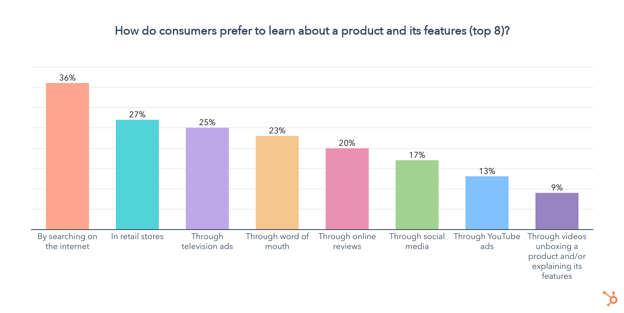
While social media, YouTube ads, unboxing videos, and streaming services are less popular when we look at all generations combined, splitting this up by age group paints a very different picture.
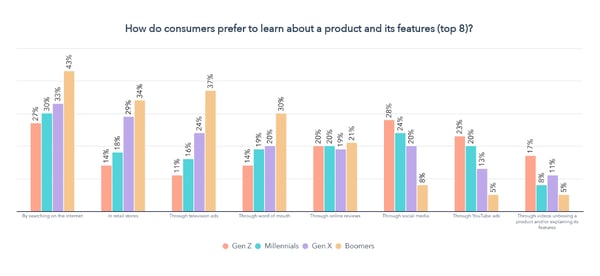 Gen Z, Millennials, and Gen X set themselves apart from Boomers through their preference for learning about products through social media and YouTube ads. Gen Z also favors unboxing videos more than any other generation.
Gen Z, Millennials, and Gen X set themselves apart from Boomers through their preference for learning about products through social media and YouTube ads. Gen Z also favors unboxing videos more than any other generation.
Meanwhile, Gen X and Boomers show a clear preference for learning about products through TV ads and in retail stores. Boomers also favor word of mouth more than any other generation.
But there are also some similarities — learning about products by searching the internet and through online reviews is popular among all generations.
So let’s dive deeper into each of the most popular channels consumers are using to learn about products.
SEO is Key for Product Discovery
36% of consumers prefer to learn about products by searching the internet, highlighting the importance of optimizing your website for SEO.
Searching the internet is the number one way to learn about products among all age groups, except for Gen Z, who prefer to use social media by just 1 percentage point. While online search is extremely popular among all age groups, it progressively gets more favor with each older generation.
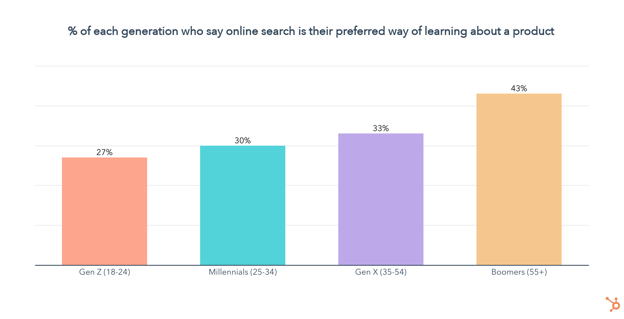
Since we know consumers are searching the web to better understand products and their features, it’s also key to get a sense of which devices they are using to create the best user experience.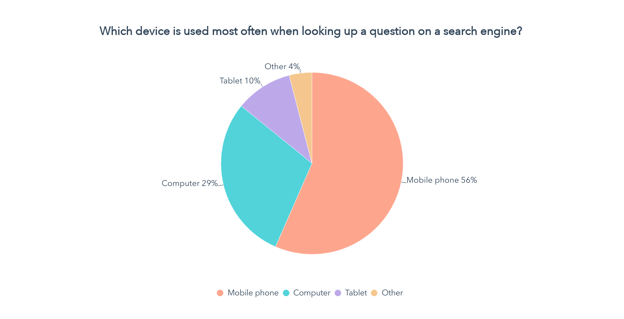
Not only are mobile phones the device of choice for over 50% of consumers when searching up a question online, but they are also the most used device when they shop online.
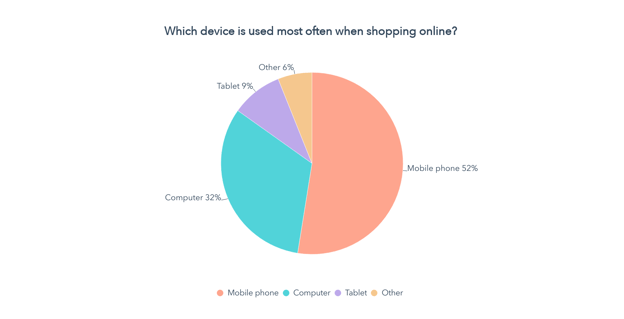
Especially when it comes to younger generations, the use of mobile devices for search dwarfs searching on a computer, meaning you should optimize your website to be mobile-first.
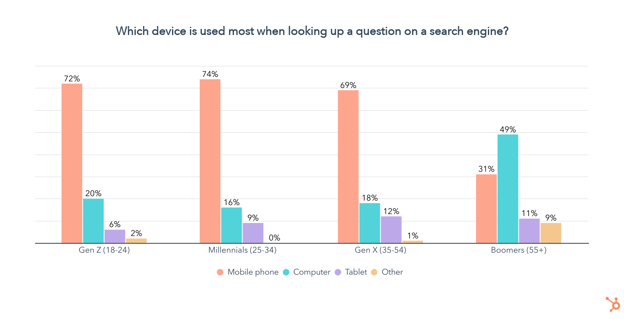
Retail Is Still Relevant, Especially for Older Generations
Coming in second place, 27% of consumers say they prefer to learn about products in retail stores. Unsurprisingly, the in-person approach is most popular among older age groups, though it isn’t completely lost on Gen Z and is still favored by almost one in five Millennials.
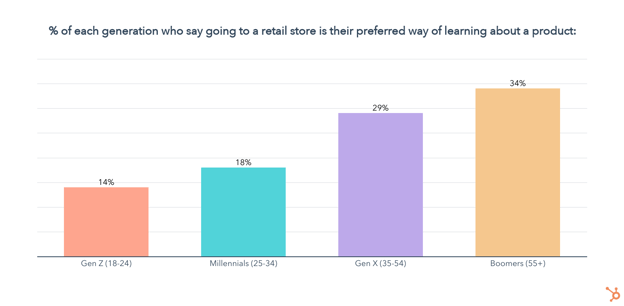
TV Ads Are Key for Boomers and Gen X
One in four consumers say TV ads are their preferred way of learning more about a product and its features. TV ads rank in the top three most preferred channels to learn about products for Gen X and Baby Boomers, but lose favor with Gen Z and Millennials who strongly prefer other digital channels like social media.
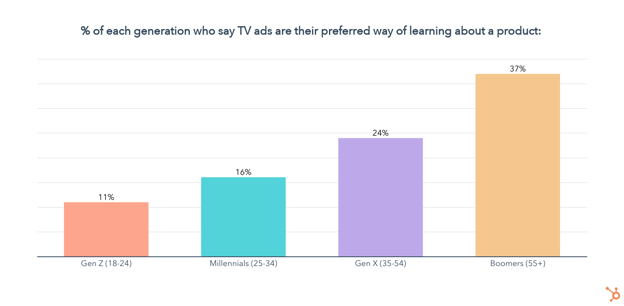
Word of Mouth Is Relevant, But Gen Z Looks to Influencers Instead
23% of consumers say they prefer to learn about products through word of mouth. Interestingly, word of mouth ranks in the top 5 channels for learning about products for every generation except Gen Z. Our Consumer Shopping Report 2022 even found that Gen Z places more importance on recommendations from influencers than their friends and family.
Online Reviews Are Sought By All Generations
One in five consumers say they prefer to learn about products through online reviews, regardless of generation. Of course, whether they go to YouTube, Amazon reviews, or a dedicated blog to get those insights will depend on their age.
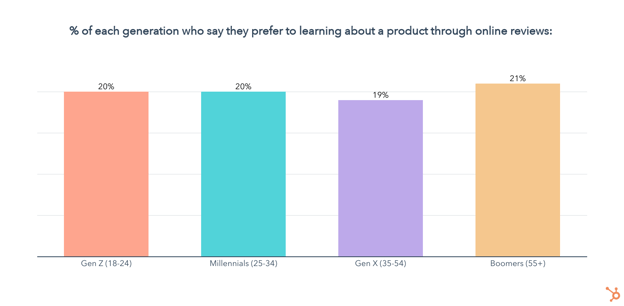
Social Media Is Key For Gen Z and Millennials
Overall, just 17% of consumers say social media is their preferred channel for learning about products and their features. However, social media comes in at #1 for Gen Z, second for Millennials, and fourth for Gen X.
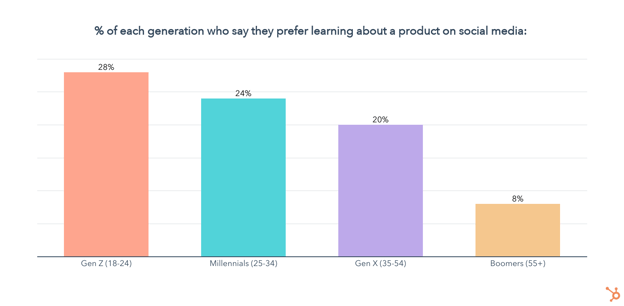
Next, let’s take a look at how consumers want to learn about products on social media.
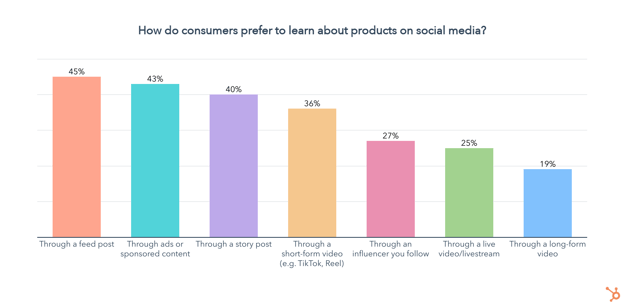
Feed posts, ads, and stories are the top three formats for learning about products on social media. 36% of consumers want to learn about products through short-form videos like TikToks or Reels, and another 27% prefer to go through influencers, which is especially popular among younger generations.
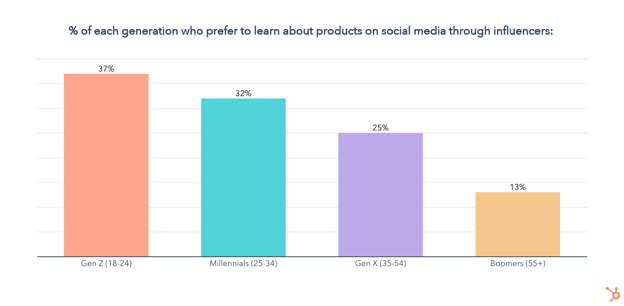
You might also be wondering what kind of content consumers want to see from brands on social media.
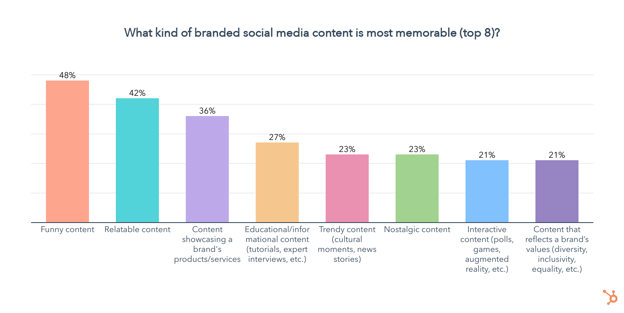
Almost half of consumers say funny content is the most memorable, followed by content they can relate to. Making content that showcases your product or service is also highly memorable to 36% of consumers.
YouTube Ads are Key For Gen Z and Millennials
Overall, just 13% of consumers say they prefer learning about a product and its features through YouTube ads, but the video platform ranks among the top channels for Gen Z and Millennials.
Unboxing Videos are a Gen Z Thing
While just 9% of consumers prefer to learn about a product and its features through unboxing videos, they are uniquely popular with Gen Z.
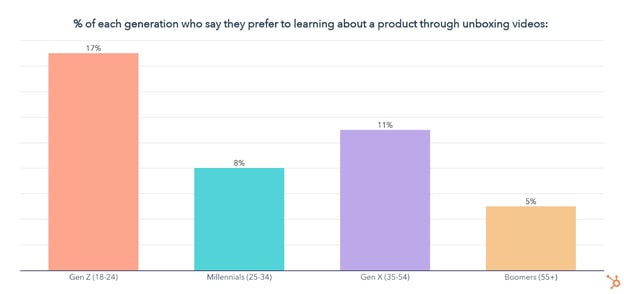
Making Sense of Consumer Data
Want to learn more about the latest trends and shopping habits consumers are navigating, and how your brand can leverage them to better meet your targets in 2022?
Check out our consumer shopping report as well as our State of Consumer Trends Report, coming in late July.
In the meantime, see how marketers are navigating 2022 with our State of Marketing Trends Report below.
![]()


![Download Now: Free State of Marketing Report [Updated for 2022]](https://no-cache.hubspot.com/cta/default/53/b0f73a5e-16e4-41fd-9511-8564efc560a7.png)
